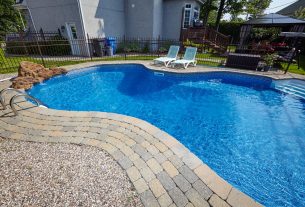Owning a pool is a luxury that comes with its share of maintenance responsibilities, one of which is vigilance against leaks. A leaking pool can lead to significant water loss, increased bills, and potential damage to your property. Recognizing the signs of a pool leak early can save homeowners time, money, and prevent unnecessary stress. Here’s a comprehensive guide to help you detect leaks and take action.
Understanding the Common Signs of a Leak
Unexplained Water Loss
A noticeable decrease in your pool’s water level can be the first sign of trouble. While it’s normal for pools to lose some water due to evaporation, especially during hot weather, a loss of more than a quarter-inch of water daily is a red flag that warrants further investigation.
Cracks or Gaps in the Pool Structure
Inspect your pool regularly for any visible cracks or gaps in the liner, tiles, or along the pool deck. These can often be entry or exit points for water escaping from your pool.
Soggy Spots Around the Pool
If you notice areas of your yard that are unusually soggy or have grass that’s greener than the rest, it could indicate an underground leak from your pool.
Algae Growth or Pool Chemistry Issues
Leaks can disrupt the balance of your pool’s chemicals, leading to persistent algae problems despite regular maintenance.
Conducting a Leak Detection Test
The Bucket Test
Place a bucket filled with pool water on a pool step (weight it down if needed) and mark the water levels inside and outside the bucket. After 24 hours, compare the two levels. If the pool water level has dropped significantly more than the water inside the bucket, you likely have a leak.
Dye Testing
For pools with visible cracks, a dye test can help pinpoint the leak. Turn off the pool’s circulation system and apply a small amount of dye near the suspected leak area. If there’s a leak, the dye will flow towards it, confirming your suspicions.
Professional Leak Detection
While DIY methods can be effective for minor or obvious leaks, some leaks may be hidden or complex to diagnose. Hiring a professional leak detection service is advisable in these cases. These experts use specialized equipment like hydrophones, dye tests, and pressure testing to accurately locate leaks, even those underground or within the pool’s plumbing.
Addressing and Repairing Leaks

Minor Repairs
Small cracks or tears in liners can often be patched with DIY repair kits. Ensure you follow the manufacturer’s instructions closely for the best results.
Professional Repairs
For significant issues, especially those related to plumbing or structural integrity, professional repair services are necessary. Attempting to fix complex leaks without the proper expertise can lead to further damage.
Regular Maintenance Checks
Incorporate leak checks into your regular pool maintenance routine. Regularly inspecting and cleaning your pool can help you spot and address leaks before they become major issues.
Navigating Towards Resolution
Detecting and addressing pool leaks early can prevent the waste of thousands of gallons of water and protect your property from damage. By being vigilant and conducting regular inspections, you can enjoy your pool without the lurking worry of unseen leaks draining your resources.
Keeping Your Pool in Prime Condition
Maintaining a leak-free pool is an ongoing commitment that pays off in the preservation of your property’s value and the enjoyment of your swimming pool. Should you encounter signs of a leak, taking prompt and appropriate action, whether through DIY methods or by calling in professionals, is key to resolving the issue efficiently.
In essence, being equipped with the knowledge to spot early signs of leaks and understanding the steps to confirm and address them are invaluable skills for any pool owner. By adopting a proactive approach to pool maintenance, you ensure that your pool remains a source of leisure and relaxation, not a cause for concern.



